- Home
- Alison Hart
Gabriel's Journey Page 2
Gabriel's Journey Read online
Page 2
He takes the straw from his mouth and points the stalk at me. “You are one mule-headed boy. Ain’t nothin’ going to change your thoughts on soldiering, am I right?”
I nod.
“Well, then, I suppose you’d best join your folks.” Grinning, Jackson raises his fists and takes up a boxing stance. For a moment we spar the air, and then he hugs me hard and quick. Before I can open my mouth to tell him I’ll be back someday, he’s out the supply room door.
Now it’s my turn to heave a sigh. I’ve already bid farewell to Jase, Short Bit, Tandy, and the other stable workers. And I’ve said goodbye to Cook Nancy, who packed me a basket of vittles, and to Mister Giles, who helped me get permission to enter Camp Nelson. But saying goodbye to all of them together ain’t nearly so hard as saying goodbye to Annabelle.
I find her in the parlor of the Main House. She’s sashaying around the room, whooshing a duster in the air. She starts chattering about yesterday’s lessons with Jase and Short Bit. “Short Bit can recite the alphabet and Jase can write his name. I know you’re learning your numbers on account of all the purse money you’re winning, but you need to join our lessons, Gabriel. If you don’t, you’ll be the only stable boy who can’t read.”
“I’d like to learn to read, Annabelle,” I say, my tone wooden.
“And do you know that Cook Nancy’s written a letter to your ma already?” Annabelle asks. I know by the way she’s attacking the chair rungs with those feathers that she don’t expect an answer. “And Mister Giles has entrusted me with his correspondence. He’s appointed me his secretary.”
“That’s a powerful title.”
“I do believe you’re right, Gabriel,” she agrees. “Secretary sounds so much grander than slave.” She spits out slave like it’s a cuss word, then patters on. “Mister Giles says this war will soon be over and every slave will be free. Then we’ll all be paid wages, like you and Jackson. He says that those who can read and write will be highly valued.”
“Maybe I can join Ma for reading and writing lessons at Camp Nelson. Reverend Fee has a school there.”
“Pish posh.” Annabelle’s back is to me as she swipes the feathers along a picture frame. “Why, I can teach better than some wattle-necked old . . .” Her voice trails off. Tilting her head, she looks at me over her shoulder. A frown creases her brow. “What did you say?”
I gulp. Annabelle’s piercing eyes have a way of tying my tongue. “I-I said I’ll soon be leaving for Camp Nelson.”
“For a visit?”
I shake my head.
“Forever?” The feather duster drops from Annabelle’s fingers and the handle clatters on the wooden floor. Her lower lip trembles.
Holding my breath, I nod. Then I clench my hands behind me, girding myself for her sharp cry and flood of tears. Instead she ducks her head and rushes from the room, soundless except for the rustling of her skirts.
I gaze after her as she flees like an apparition up the winding stairs.
“Annabelle!” I call, but her name sticks in my throat.
You are a treed possum, I think, cursing myself. Why is it so hard to tell her that I’ll miss her? Folks say I have a magic touch with horses, but those charms sure fail me with Annabelle.
Hurrying from the parlor into the entrance hall, I look up the stairs. Silence floats from the second floor. I strain my ears, and when I don’t hear the scuffle of returning shoes, sorrow fills me. As soon as I get to Camp Nelson, I’ll learn my letters so I can pen Annabelle a proper goodbye.
Bong . . . bong . . . The clock in the parlor strikes seven times. It’s time to go. I can’t tarry any longer.
My eyes cut to the carved panels on the front door. Slaves are forbidden to use the main entrance unless they’re serving the master, but I’m a slave no more. This may be the last time I leave this house.
I grasp the shiny brass knob, heave open the door, and walk boldly onto the veranda.
Morning sun streams from the east. At the bottom of the stairs, Old Uncle kneels in the rose garden. He’s picking beetles off the leaves and pinching them between his finger and thumb. He glances up. I expect a surprised look when he sees a black boy standing on the portico, but his brown, wrinkled face is a mask.
“I hear you’s leavin’,” Old Uncle says, his attention back on the beetles, which have chewed lacey holes in the leaves.
I thump down the steps. “Yes sir. I came to say goodbye.”
“Followin’ your ma and pa to Camp Nelson?”
“Yes sir.”
He grunts, as if satisfied. “A family should be together.”
I hear a crunch as he snaps another beetle. “Take care, Old Uncle.”
“And you, Gabriel Alexander.”
I jog down the walkway and underneath the arched trellis. I need to retrieve my packed belongings from the barn—and say goodbye to the horses.
My innards clench. I’ve put it off as long as I can.
I drag my feet the whole way to the training barn, which is as silent as the Main House. All the workers are at the carriage barn, meeting to discuss contracts and wages. Seems Mister Giles forgot to mention Jackson’s most important demand—that grooms and stable hands at Woodville Farm be treated as free men.
Since the flies are biting, the colts and fillies have been brought in for the day. I make my way slowly down the aisle, stopping at each stall. Savannah, Captain, Daphne, Arrow, Blind Patterson, Tenpenny, Sympathy, and at the end of the row, Aristo. Heads dip as they munch sweet hay. I breathe their scent one last time, admiring the sheen of their coats, the ripple of their muscles, the light in their eyes. I don’t want to forget them—ever.
Leaning over Aristo’s door, I glide my fingers down his silky neck. He nuzzles my cheek and chews close to my ear.
“’Risto,” I whisper. “You are the finest colt in the States, and I’m honored to have been your jockey.”
As long as I can remember, these have been my horses. How can I tell them goodbye?
I can’t.
Tears threaten, reminding me I ain’t a man yet. I dash down the aisle to the supply room, snatch up my basket and my blanket-wrapped bundle, and bolt from the barn.
My bare feet pound the lane as I race past the Main House, the basket thumping my leg. I can’t hold back the tears and they roll down my cheeks, plopping from my chin like raindrops. I run past the armed guard at the end of the lane. Then, turning east on the Frankfort Pike, I fly across the bridge. I run until a stitch splits my ribs, and I finally double over, gasping. When I catch my breath and steal a glance over my shoulder, Woodville Farm is long behind me.
* * *
The sun is high overhead so I know I’ve been walking a good four hours. I’m wrapped in misery and loneliness, and my stomach grumbles. Cook Nancy’s vittles disappeared by the third mile, and the basket’s as empty as my insides—and my heart.
I’ve left the only place I’ve ever called home, and the only folks I’ve ever called friends.
A stick snaps in the brush, and I jump like a startled rabbit. Part of me expects to see Keats and Butler, those Rebel no-goods who stole Captain Conrad and knocked me senseless. Another part of me worries that One Arm Dan Parmer and his band might be back in Kentucky.
Even though I’ve traveled to Camp Nelson before, I’ve always had company. This time I’m one skinny, scared boy on my own.
The rattle of wheels makes me whirl in my tracks. A pony’s muzzle, followed by a pair of fuzzy ears, pokes through a cloud of dust kicked up by a peddler’s wagon. I spring to the roadside, clutching my bundle. The pony has a hitch in its walk, so it moseys by me, and I’m in no danger of being crushed by its hooves.
A gnarled white man sits on the wagon seat. Behind him, keys dangle and sway from rows of hooks. The man peers at me with one eye; the other is an empty socket. A dirty rag is wrapped around his forehead. Too late, he tugs it down, angling it over the puckered flesh.
I stare back, never having seen a man with one eye.
“Whoa, Betsy,” the man says. The pony halts with a wheezy sigh. Cocking his head like a robin at a wormhole, the man studies me. Golden letters and curlicues decorate the wooden sides of his wagon, which looks like a box on wheels.
“Good day, sir,” I say hesitantly.
“Good day? I’d say it’s a bad day,” he barks. “At least bad for you, colored boy. Why, you’re a sorrier sight than me. And I’m ’bout as sorry as they come.”
“Yes sir.”
“Yes sir? Are you agreeing that I’m ’bout as sorry as they come?”
“No sir!”
“You should say, ‘No sir, I ain’t sorry at all. I’ve got my youth and my two feet and my future ahead of me.’”
“Uh-h-h,” I stammer, not daring to reply nay or yea.
He cackles. “Don’t mind me. I’m daft. Least that’s what the Rebels said afore they stole my wares.”
“Rebels! Was it One Arm Dan Parmer?”
Rubbing his chin, gray with dirt and stubble, he thinks a moment. “Captain in charge did have one arm. Might be why he took pity and didn’t shoot me—’cause we had that number in common.”
I shudder. “Is One Arm and his band of guerrillas headed this way?”
“Nah. Those Rebels know better than to show their scoundrel selves this close to Lexington. Where are you headed, black boy?”
“Camp Nelson.”
“I’m headed into the city to report those thieves and restock my wagon. But I don’t mind traveling the outskirts a ways if you’d like me to drop you at the Danville Pike.”
“I’d be obliged.” I nod up at the keys. “Luckily they didn’t steal those.”
“Pah! They don’t want keys, since they have no doors. They stole everything else though: eyeglasses, tonics, combs, even a dozen cans of peaches.”
My mouth waters at the mention of peaches.
“But they didn’t find my cash.” He winks his one eye. “Climb aboard, youngun. Betsy and I could use the company. Unlike most folks around these parts, we ain’t choosy about a traveler’s skin color.”
I toss my bundle and basket into the back of his wagon, which is empty except for a pile of moth-eaten blankets, a stained ticking-striped pillow, and a feed bucket filled with moldy corn. I guess even the Rebels weren’t that desperate.
Using the wheel spokes like rungs, I clamber into the wagon. He holds out one grubby hand. “Name’s Pie.” His clothes smell as if they ain’t been washed in his lifetime.
We shake and I say, “Pleased to meet you, Mister Pie. My name’s Gabriel Alexander.”
He clucks to Betsy, who gimps off. I sway in the wagon seat, glad for the companionship no matter how odorous.
“Name’s Pie ’cause I used to sell pies,” he explains, even though I didn’t ask. “Then it became One-Eye Pie, and now it’s back to jest Pie. Lost my eye in the war. A redcoat shot it clean through with a lead ball.”
“A redcoat?” I know about redcoats on account of Mister Giles being British. “They ain’t fighting in this war.”
“This war!” He harrumphs in disgust. “I’m talking about the War of 1812 when we were fighting those blackhearts the British, not shooting at our neighbors.”
I goggle at him. If Pie was fighting in 1812, then he’s older than Old Uncle.
“I was ’bout your size when I enlisted. Lied and told ’em I was sixteen.” Pie launches into a tale of joining up with the U.S. Army. As he jabbers on, I gradually sag against the back of the wagon, half-asleep.
Suddenly Pie’s voice rises, waking me from my stupor. “The firing was deafening!” he shouts. “All around me, soldiers toppled to the ground until I was tripping over bloody arms and limbs. Then I found myself face to face with a redcoat. A boy ’bout my age. We gaped at each other, then raised our muskets.” Dropping the reins onto his lap, Pie holds an imaginary rifle against his shoulder and aims. “I pressed the trigger, but nothing happened.” He grunts. “In the confusion, I’d forgotten to reload. My first skirmish and I lose my eye to a British boy’s bayonet!”
Didn’t he say a mile back that his eye had been shot out with a lead ball? “My pa’s at Camp Nelson,” I say, hoping to get him onto another subject.
“Your pa’s a colored soldier?”
I nod proudly. “A corporal in the Union army. He’s helping Captain Waite organize a colored cavalry. I aim to join him and train cavalry horses so we can beat the Confederates.”
Pie harrumphs. “If you ask me, this is a dang-burned foolish war.”
“It ain’t foolish at all,” I protest. “We’re fightin’ the Rebels ’cause they don’t want slaves to be free.”
He points to the rag around his head. “Just pray no Rebel takes your eye. Did I mention how a shard from a cannonball knocked mine clean out? Whoa, Betsy.” Stopping the pony, Pie gestures to the right, and I recognize the Lexington and Danville Turnpike. “This is your jumping-off point, youngun.”
I hop from the seat and yank my bundle from the wagon bed, leaving the empty basket as meager payment. “Much obliged for the ride, Mister Pie—and for your company.” Tossing my bundle over my shoulder, I head south on the Pike wishing I’d had more time to set Mister Pie straight about this war.
I keep up a brisk pace. The road is empty. Not a sign of life except a few crows picking in the cornfield beyond a stone fence. As I walk, I sing “Sweet Lorena” to chase away the silence. But the song is Savannah’s favorite, and it reminds me how much I miss those horses. I switch to a hymn instead. My singing startles the crows and they flap toward the sky. I hope the black birds circling over my head ain’t bad omens. I’m uneasy enough about this journey.
My innards grumble and I eye the drying ears of corn. It’s field corn for livestock, I know, but it’s long after noon mealtime and right now my stomach ain’t particular.
I glance up and down the road, making sure I’m alone. Reaching far over the stone fence, I grab an ear and twist it from the stalk. Then I hunker behind some brush where I can’t be seen from the road.
I strip away the husk. The orange-yellow kernels are as hard as acorns in the shell, but I chew a few to a pulp, swallow, and start on a second row. Soon the rumbling quiets in my insides. I’m wishing for a plate of Cook Nancy’s cornbread when I hear rustling in the stalks behind me.
My jaw stops in mid-chew.
Dry leaves crackle. A stalk snaps. Someone’s stomping through that corn.
I stare guiltily at the half-eaten cob in my hand. Thieves have been hanged for less!
Chapter Three
Quickly, I toss the ear of corn over my shoulder. Someone hollers, “Ow!” It’s a holler I’ve heard many times before. I rise from my hiding place and peer over the stone fence. Between the leaves I spy striped taffeta.
A gloved hand pushes a stalk aside and a girl steps from the rows. Her straw hat is askew and corn mold dusts her chin.
“Annabelle? Is that you?”
“It is, Gabriel,” she replies. Her chin is tipped up defiantly despite the sweat trickling down her cheeks and the hair straggling from under her crooked hat brim.
My mouth falls slack. I’d expected to see a riled-up farmer or a vagrant, not a girl in a taffeta skirt. “What are you doing here in a cornfield, dressed for tea?”
“Hush your teasing and help me over this fence.”
Grasping Annabelle’s hand, I tug her to the top of the stone wall. She’s wearing layers of fabric over petticoats, and the whole affair billows in my face, threatening to smother me. I’m astounded she isn’t wrestling a parasol through the corn, too. She teeters a moment atop the fence, then jumps to the ground, falling against my chest. Heat creeps up my neck.
We spring apart, and I notice her cheeks are as flushed as mine. “Thank you,” she says breathlessly as she rights her straw hat. Black-eyed Susans poke from the hatband, as if she’d had time to dally by the wayside and pick them.
“I’d be much obliged if you’d retrieve my belongings.” She waves toward the cornfield, and I see
a basket, a valise, and a parasol on the ground between two rows.
I hesitate. I want to be gallant, but I know how corn leaves tear at your skin. Since Annabelle is garbed from head to toe, she escaped most of their slashes. My arms and feet are bare.
“The basket’s packed with honey, bread, and rabbit pie,” Annabelle says sweetly.
In two shakes I’m over that fence and back, not minding the scratches on my arms. I hand her the parasol and hustle down the pike to a shady tree, carrying the basket and valise. Annabelle takes her time catching up with me. She removes a small quilt from the basket and spreads it out like we’re having a noon picnic. She sinks onto the quilt and arranges her skirts in a ladylike manner. After tugging the purse strings from her wrist and carefully pulling off her gloves, she opens the basket and sets out the food.
I kneel next to her, drooling at the sight of Cook Nancy’s bread and pie, their crusts flaky and golden. Annabelle’s quiet as she rips off a chunk of bread and dribbles honey on it. I’m bursting to find out why she was hiding in a cornfield beside the road to Camp Nelson, but I gather she’ll tell her tale when we’re both fed.
She hands the bread to me. “Ladies first,” I say despite my hunger.
“Please take it,” she says softly. I hear a catch in her voice, as if she’s holding back tears.
Leaning on one elbow, I gobble the bread, my gaze on Annabelle. She keeps her head lowered as she honeys some bread for herself. She takes tiny bites while I wolf down a second slice.
Finally Annabelle dabs her lips with a linen napkin. “I suppose you’re wondering why I’m here. And rest assured it is not because I missed you.”
I raise my eyes to the heavens. “Thank the Lord.”
She looks up sharply. When she sees I’m grinning, she hurls a wooden spoon, which I dodge. “You should thank the Lord I came along, Gabriel, since it appears you were near to starving.” She serves me rabbit pie on a tin plate. “Go on. I ate a roasted potato while I walked.”
I pick up the wooden spoon and dig in. “If you didn’t follow me, how’d you know the way?” I ask between chews.
Her nostrils flare. “I can read road signs and maps, of course.”

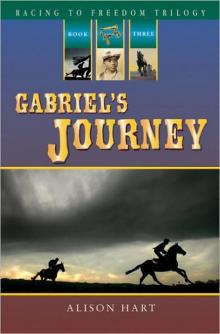 Gabriel's Journey
Gabriel's Journey Whirlwind
Whirlwind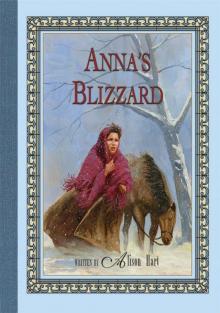 Anna's Blizzard
Anna's Blizzard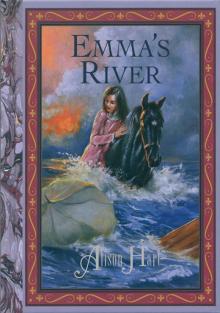 Emma's River
Emma's River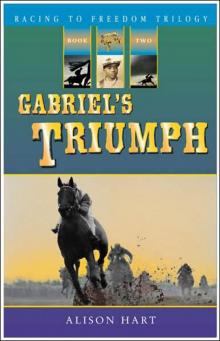 Gabriel's Triumph
Gabriel's Triumph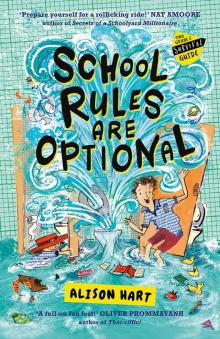 School Rules Are Optional
School Rules Are Optional Bell's Star
Bell's Star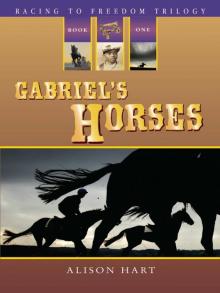 Gabriel's Horses
Gabriel's Horses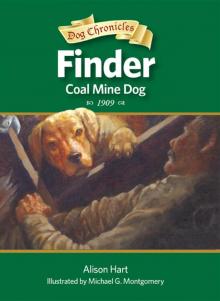 Finder, Coal Mine Dog
Finder, Coal Mine Dog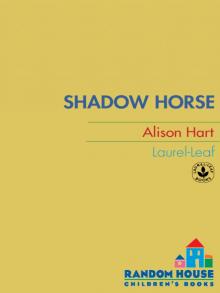 Shadow Horse
Shadow Horse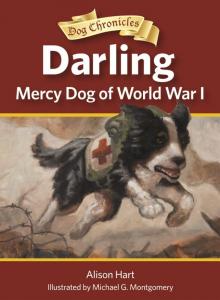 Darling, Mercy Dog of World War I
Darling, Mercy Dog of World War I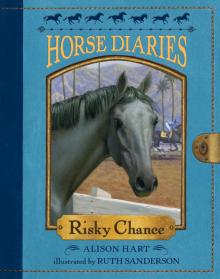 Risky Chance
Risky Chance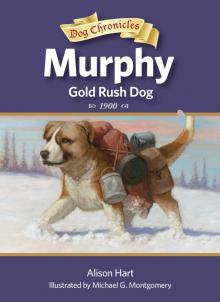 Murphy, Gold Rush Dog
Murphy, Gold Rush Dog